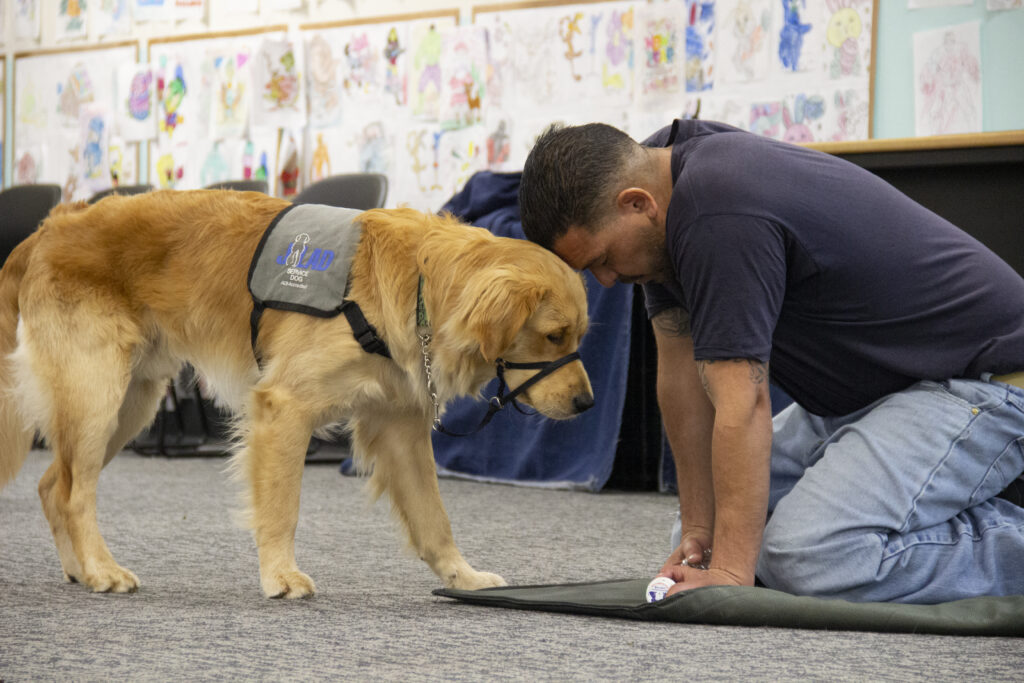Tonic knew something was wrong well before his human collapsed to the floor.
The 12-month-old Labrador retriever began tugging a newspaper away from his handler, Luis Salas-Juarez, sensing the contents were distressing him.
As Salas-Juarez became more agitated, Tonic put his paws in the man’s lap, attempting to help him calm down, then went to fetch Salas-Juarez’s medication in another room as his handler began showing signs of a panic attack.
Tonic is one of 14 future service dogs now in training at Oregon State Correctional Institution, the medium-security prison that houses about 850 men just outside Salem on Highway 22.

The prison recently added a training program through Salem nonprofit Joys of Living Assistance Dogs, which provides dogs to veterans, first responders and other people with disabilities.
Last week, the handlers showed off their dogs’ skills in the prison’s visiting room, to a crowd of about 100 visiting relatives, prison officials and other guests.
Handlers said training the dogs helps them give back to the community, improves their mood and gives them something positive to focus on while serving time.
“Before I would just hide myself in drugs or violence or prison stuff,” said Shawn Jeffrers-Monro, 42, who’s training a 9-month-old Labrador retriever, Urban. Now, he said his dog’s companionship has helped him deal with challenges, including his mother’s recent death, in a more positive way.
“Doing all this time, you become selfish because everything is all about you,” said handler Pedro Suarez, 32. “It’s not just about us any more.”
Joy St. Peter founded JLAD in 2004 after earning a certificate in service dog training. The program is accredited by Assistance Dogs International.
St. Peter turned to prisons after finding volunteers on the outside weren’t training as consistently as needed for service animals. Puppies placed with volunteers typically took a few months to master a new skill, she said.
But when she taught incarcerated trainers, their puppies had the skill mastered in just a few weeks. The dogs benefitted from having trainers who were dedicated to them full time.
“I had to reevaluate everything I was doing to keep up with them,” she said, speaking at the OSCI event.

The partnership between the JLAD nonprofit and the state department of corrections began almost a decade ago, with a program at Eastern Oregon Correctional Institution.
Capt. Jeff Frazier was seeking a way to get dogs into the Pendleton prison when he heard a radio story about a similar program in Washington State. He reached out to JLAD, got approval from his superiors, and brought the first crop of future service dogs to the prison in 2016.
Since then, incarcerated people have trained about 150 dogs at Eastern Oregon.
“It’s a benefit to everyone. It reduces the tension. It’s hard when you see a dog not to have a smile,” Frazier said. He helped expand the program to OSCI.
Frazier said the program is life-changing for the handlers selected to work with the dogs. He recalled once getting a letter from a veteran who received a service dog trained by men at the prison. The veteran called the trainers his heroes.
It made a big impact “to have someone who is a hero refer to them as a hero,” Frazier said.
Training for future service dogs begins at birth, with trainers getting them used to being held and handled.
Some of the current trainees at OSCI were born in the prison. A litter delivered on New Year’s Eve includes 12-week-old Yasmin, who’s starting her service dog career with strength training that forms the basis of future skills.

Dogs spend two weeks in prison learning skills with handlers, then two weeks on the outside with volunteers who help accustom them to the outside world, practicing things like crossing streets or visiting noisy cafes.
Handlers keep dogs with them during the day, walking them down prison hallways on leash and taking them out to the yard. At night, the dogs sleep in crates.
“Each dog we get to work with is an extension of ourselves,” said Hugh Crow, 34, who transferred to OSCI from the Pendleton prison to help get the dog program off the ground.
His parents and grandparents attended the demonstration at the prison, applauding as Crow and a fellow handler led Urban on stage.
“It’s given him a lot of purpose,” said Ronnie Westcott, Crow’s mother.
“It just shows the gentleness of a lot of these men, regardless of that their crime may be,” father Carl Crow said.

By nine months old, the dogs are adept at staying put on a pad, as directed, even when handlers attempt to lure them off with rawhide bones, balls and favorite toys.
When they graduate after 18 to 24 months, the dogs will know 94 commands and be able to get help for their handler, fetch medication, open doors, retrieve items and comfort their human companion in situations of stress.
Handlers often learn about the person their dog is destined for during their training and can tailor their skills to meet their future human’s needs.
Urban will eventually be a service dog for a woman with no right arm.
“We’ll basically try to make him her right arm,” Jeffers-Monro said.

Contact reporter Rachel Alexander: [email protected] or 503-575-1241.
SUPPORT OUR WORK – We depend on subscribers for resources to report on Salem with care and depth, fairness and accuracy. Subscribe today to get our daily newsletters and more. Click I want to subscribe!

Rachel Alexander is Salem Reporter’s managing editor. She joined Salem Reporter when it was founded in 2018 and covers city news, education, nonprofits and a little bit of everything else. She’s been a journalist in Oregon and Washington for a decade. Outside of work, she’s a skater and board member with Salem’s Cherry City Roller Derby and can often be found with her nose buried in a book.









